
The numerous doctoral student community at the Warsaw School of Economics comprises doctoral students studying at collegia, and doctoral students attending the Doctoral School. Each of these several hundred people has their own history and their own plans. Let us present at least a few aspects that may play a special role in the lives of our students.
Some of us aim to travel abroad, and some of us come from abroad. Simultaneously, one of the biggest aspects of our lives is building a family and raising children. In terms of work, some doctoral students are involved in university councils and committees, and some already work at SGH in administrative or academic positions. Those covered by dedicated ministerial programmes provide scientific support to the business entities they are employed at.
To sum up, our lives are affected by numerous and diversified factors. We hope that the following entries will shed some more light on the diverse aspects of doctoral life that we experience during our adventure at the Warsaw School of Economics.
JOLANTA BARTOSZEWSKA, Head of the PhD Student Union
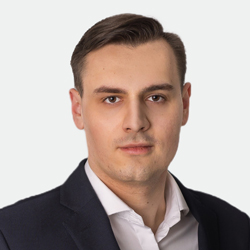
Michał Lechowski, 1st year doctoral student at SGH Doctoral School
As a representative of the Doctoral Student Union in the Scientific Council for Finance and Economics, I would like to share my reflections on the role of doctoral students in scientific councils and their contribution to the university’s academic life.
Doctoral students participating in scientific councils of specific disciplines play an advisory role. Although we do not have the right to vote, our role in discussions is still important. I believe that taking the young scientists’ point of view into account during council meetings is valuable for shaping perspectives and understanding the dynamically changing world of science.
Participating in academic councils allows us to follow and understand decision-making processes that are valuable to our development in the academic world. Being able to observe experienced academics discussing research and making teaching decisions gives us a better insight into the academic world. Our participation allows us to exchange views and ideas, which is essential to creating a sustainable SGH environment.
In conclusion, it is very important for doctoral students to take part in the scientific councils of SGH and thereby be a part of the academic life of our university. Our role in these bodies proves that SGH is open to diverse perspectives and that the university is involved in shaping active members of the academic community.
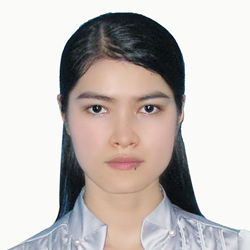
Thi Ngan Nguyen
My name is Thi Ngan Nguyen, I come from Vietnam. I am currently a third-year doctoral student of Finance at SGH.
I obtained my Master’s degree in Vietnam and became a lecturer at University of Economics and Law, Vietnam National University. I had identified a gap in my work as I found that my knowledge is insufficient to fulfil my responsibilities as a lecturer. I needed an environment where I can enrich my knowledge.
Since Warsaw School of Economics is considered one of the oldest and most prestigious business universities, the doctoral course at SGH will definitely provide me with such an environment and allow me to continue my quest for finance knowledge. The programme supports research, and it is also tied to the labour market. Lecturers at SGH are very professional, have useful practical skills and, most importantly, do activities that keep me connected with the course both practically and theoretically. Since joining SGH, I have seen that Professors always create a friendly atmosphere in the classroom. Also, students may apply for valuable internship and student exchange programmes with renowned partner universities. There is no doubt that knowledge and skills obtained at SGH helped me to get a good job at a big international bank in Warsaw after finishing the first year. Besides, as a foreign student, I have dealt with Doctoral School and dormitory staff on several occasions. They are always happy to help students, and do a great job to create friendly international environment. I’ve also benefited from participating in extracurricular activities organized by student organizations and clubs.
I really appreciate what SGH has to offer: valuable knowledge from experienced and respected Professors, rich social life, and the career prospects. Studying at SGH is one of my best decisions and I am very proud of being a part of the SGH community.
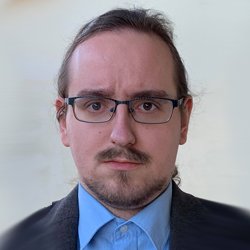
Mateusz Panowicz, collegium doctoral student
I can talk about SGH from many various perspectives I have gained since the start of my bachelor studies 12 years ago. Still, let me focus on the latest one – the perspective of an administrative employee of the Research Support unit. Although it is not an obvious path for a doctoral student, it is more interesting that it could seem.
Probably most students associate Research Support with services connected to the Young Scientist programme. For some it is a place where applications for the Rector’s Grants or inter-university grants are filed. Some have probably heard about the recently launched initiative of academic mentoring, dedicated to research employees.
The scope of activities of the Research Support unit is much broader, though. Most of all, it coordinates all matters connected with the evaluation of the university’s scientific activities, which determines the right to run studies and doctoral schools, to award academic degrees and, to some extent, also the university’s budget. It also supports the collegia in their employee appraisal. It is involved in the works of a range of university teams, such as the international accreditation team. And much more. In short, Research Support is a unit supporting the academic policy of SGH both in terms of administration and substantive knowledge.
For me, as a person passionate about education systems, also at the higher level, having considerable experience in the field of education quality and lifelong learning, work in the Research Support unit gives practical insight into another interesting area. It provides an opportunity to cooperate with scientists representing different disciplines. It also makes it possible to develop a broader view on science and higher education, and to understand their mechanisms even better. Most of all, however, it allows to see scientific research from the perspective of those who support it, but are often unappreciated.
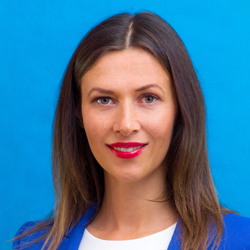
Aneta Siejka, 3rd year doctoral student at SGH Doctoral School
Doctoral studies require engagement throughout the education process. It is important to note that students having families must combine professional and family responsibilities. That is why good time planning and setting priorities is so important.
I am a doctoral student at SGH and a mum of three: 14-, 11-, and 6-year old. I also work professionally. For three years I have been combining doctoral studies with being a parent. It is challenging to take care of children who are often ill, to find a way to tend to them, and study and work simultaneously. Therefore, I really appreciate solutions that facilitate combining studies with family responsibilities: online classes and seminars, flexibility and understanding of lecturers, as well as help from the family and other students.
Doctoral students who are parents often point out to challenges connected also with other tasks, such as participation in scientific conferences, writing articles and trips abroad. These may be difficult to combine with childcare, but not impossible, if we apply good planning and study-work-life balance approach.
Tips for doctoral students who have families:
Plan. Determine at the beginning of studies how much time you want to dedicate to studying, work, and family.
Be flexible. Sometimes you have to change plans, so it is important to be prepared for surprises.
Try various arrangements that could facilitate combining studying with family life.
Accept support from family and other students. Don’t be afraid to ask for help if you need it.
Combining doctoral studies with parenting is a big challenge, but it can be satisfying as children can observe their parents learning and developing. Doctoral students having families have to find time for studying, work and childcare. This requires determination, good planning, and flexibility.
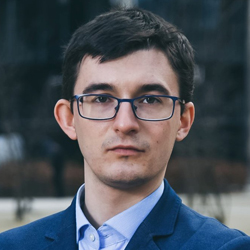
Bartosz Sobik, 4th year doctoral student at SGH Doctoral School
Being a doctoral student at the Doctoral School allows not only for studying and research on-site but also doing international activities research-wise. Thus, doctoral students at SGH have a unique opportunity to take part in scientific conferences, conduct research abroad, and meet researchers from all over the world, which is crucial for their development and their scientific career.
As part of the project financed by the NAWA, SGH Warsaw School of Economics offers a possibility to spend from 1 to 10 months abroad on a research stay. Under this project, I was able to spend a two-months research stay at the Technical University in Berlin. This time was a unique opportunity to meet inspiring researchers and enhance my research for doctoral dissertation. I could even give a lecture as a guest researcher and get involved in valuable networking.
I should also mention the extraordinarily friendly atmosphere within the research team. The German approach to the formation of research teams is very inspiring – some of the team members were also students (even undergraduates), team-building trips are a regular part of the academic year, and daily outings of the whole team for lunch in the university canteen (together with professors) were a daily routine. This habit fostered good integration, helped us make friends and increased productivity. Maintaining work-life balance also meant getting to know the local cuisine (particularly currywurst and, surprisingly, dӧner kebaps), culture and numerous tourist attractions.
The research internship in Berlin was a unique opportunity for me to grow academically, broaden my horizons and personally meet renowned scientists working on similar research topics. Without any doubt it was one of the most valuable experiences during my entire doctoral studies. Opportunities for international activities offered by the SGH Doctoral School are an excellent form of scientific development, visiting renowned research institutions and establishing scientific contacts.
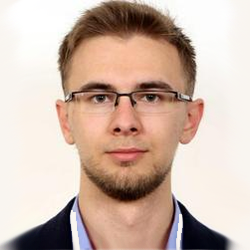
Michał Taracha, 3rd year doctoral student at SGH Doctoral School
According to the Polish Graduate Tracking System (ELA), SGH ensures convenient conditions for starting a career in business: SGH graduates have the highest average earnings, and they establish the biggest number of companies, compared to other public economic universities. SGH also has one of the lowest risks of graduate unemployment rates in Poland. But studying at SGH also gives an opportunity to prepare for future academic and teaching career. As a participant of the first edition of the Young Scientist programme, I had an opportunity to start working with the advisor of both my master’s and doctoral theses. The programme has also given me the opportunity to work at the university while studying, initially in an administrative position, and then as an assistant. As a third-year doctoral student I have already worked at the university for four years, and I have been involved in five research projects and co-authored 16 scientific articles. These activities allowed me to channel my research interests.
Although since 2018 the doctoral school system has not been conducive to doctoral students holding classes (especially before their mid-term appraisal), our university allows us, sometimes indirectly, to try our hand in teaching. In my case I have done it on the bachelor course, thanks to Student Academic Association for Economic Geography and Regional Research. With my colleagues from the Association we launched a series of lectures preparing for the maturity exam, entitled “Geography – I like it”. Some of them were attended by as many as 700 people. On bachelor and master courses I have also held two other lectures dedicated to students, summing up the material on economic geography. In the Doctoral School I am only beginning my teaching adventure with classes on global demography and workshops under the Econometric Game project.
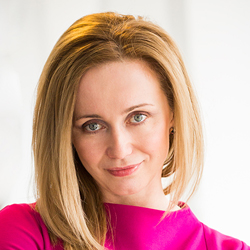
Katarzyna Wałęga, 1st year doctoral student at SGH Doctoral School
I graduated from the Economic University in Kraków, and completed master studies on the faculty of international economic and political relations, as well as postgraduate studies. Since October 2023 I have been doing the “Implementation doctorate” project at SGH.
The objective of the “Implementation doctorate” programme run by the Ministry of Education and Science, is to create conditions for cooperation between higher education and science entities, and the social and economic environment, as part of doctoral schools, aiming at educating doctoral students in cooperation with their employers. As a result of this cooperation, effects of academic activities of doctoral students are implemented in business entities they work at.
The business for which I carry out my project, and with whom I have been professionally connected for years, is Grupa Azoty SA. My research project covers building a controlling model to support management processes at Grupa Azoty SA applied in innovative research projects. Acceptance and financing of my project by the Ministry of Higher Education and the possibility to carry it out with the SGH Doctoral School is a double distinction for me.
Considering the recent few very active months spend at the university, among other doctoral students and academic staff of SGH, I am very optimistic and excited about the coming years, in terms of both effective academic cooperation, and, equally importantly, social relationships.

